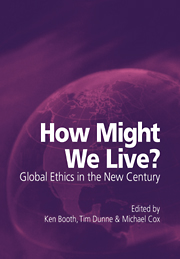Book contents
- Frontmatter
- Contents
- Notes on Contributors
- Acknowledgements
- Foreword
- Introduction: How Might We Live? Global Ethics in a New Century
- Individualism and the Concept of Gaia
- Bounded and Cosmopolitan Justice
- Globalization From Above: Actualizing The Ideal Through Law
- A More Perfect Union? The Liberal Peace and the Challenge of Globalization
- International Pluralism and the Rule of Law
- Towards a Feminist International Ethics
- Contested Globalization: The Changing Context and Normative Challenges
- Universalism and Difference in Discourses of Race
- Does Cosmopolitan Thinking Have a Future?
- Individuals, Communities and Human Rights
- Thinking About Civilizations
- Index
Individualism and the Concept of Gaia
Published online by Cambridge University Press: 04 August 2010
- Frontmatter
- Contents
- Notes on Contributors
- Acknowledgements
- Foreword
- Introduction: How Might We Live? Global Ethics in a New Century
- Individualism and the Concept of Gaia
- Bounded and Cosmopolitan Justice
- Globalization From Above: Actualizing The Ideal Through Law
- A More Perfect Union? The Liberal Peace and the Challenge of Globalization
- International Pluralism and the Rule of Law
- Towards a Feminist International Ethics
- Contested Globalization: The Changing Context and Normative Challenges
- Universalism and Difference in Discourses of Race
- Does Cosmopolitan Thinking Have a Future?
- Individuals, Communities and Human Rights
- Thinking About Civilizations
- Index
Summary
Introduction: why Gaian thinking is not a luxury
The idea of Gaia—of life on earth as a self-sustaining natural system—is not a gratuitous, semi-mystical fantasy. It is a really useful idea, a cure for distortions that spoil our current world-view. Its most obvious use is, of course, in suggesting practical solutions to environmental problems. But, more widely, it also attacks deeper tangles which now block our thinking. Some of these are puzzles about the reasons why the fate of our planet should concern us. We are bewildered by the thought that we might have a duty to something so clearly non-human. But more centrally, too, we are puzzled about how we should view ourselves. Current ways of thought still tend to trap us in the narrow, atomistic, seventeenth-century image of social life which grounds today's crude and arid individualism, though there are currently signs that we are beginning to move away from it. A more realistic view of the earth can give us a more realistic view of ourselves as its inhabitants.
What is the theory?
The current Gaian thinking that I believe can help here is a new scientific development of an old concept. The imaginative vision behind it—the idea of our planet as in some sense a single organism, is very old. Plato called the earth ‘a single great living creature’ and this is language that people in many cultures would find natural.
- Type
- Chapter
- Information
- How Might We Live? Global Ethics in the New Century , pp. 29 - 44Publisher: Cambridge University PressPrint publication year: 2001



